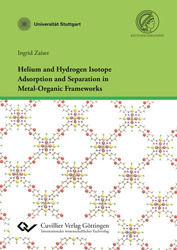| Fachbereiche | |
|---|---|
| Buchreihen (97) |
1382
|
| Nachhaltigkeit |
3
|
| Gesundheitswesen |
1
|
| Geisteswissenschaften |
2372
|
| Naturwissenschaften |
5408
|
| Mathematik | 228 |
| Informatik | 320 |
| Physik | 980 |
| Chemie | 1364 |
| Geowissenschaften | 131 |
| Humanmedizin | 243 |
| Zahn-, Mund- und Kieferheilkunde | 10 |
| Veterinärmedizin | 108 |
| Pharmazie | 147 |
| Biologie | 835 |
| Biochemie, Molekularbiologie, Gentechnologie | 121 |
| Biophysik | 25 |
| Ernährungs- und Haushaltswissenschaften | 45 |
| Land- und Agrarwissenschaften | 1005 |
| Forstwissenschaften | 201 |
| Gartenbauwissenschaft | 20 |
| Umweltforschung, Ökologie und Landespflege | 148 |
| Ingenieurwissenschaften |
1798
|
| Allgemein |
98
|
|
Leitlinien Unfallchirurgie
5. Auflage bestellen |
|
Erweiterte Suche
Helium and Hydrogen Isotope Adsorption and Separation in Metal-Organic Frameworks
Ingrid Zaiser (Autor)Vorschau
Inhaltsverzeichnis, PDF (42 KB)
Leseprobe, PDF (210 KB)
The separation of isotopes has always been a challenge because of their identical size, shape and thermodynamic properties. Nowadays, the extraction of deuterium is performed e.g. by the Girdler Sulfid process or cryogenic distillation, which lead to low separation factors (below 2.5) in combination with high energy costs. The standard way to produce helium-3 is to skim it as a byproduct of the radioactive tritium decay.
In this thesis, two alternative approaches have been investigated for the separation of light isotopes, Quantum Sieving and Chemical Affinity Sieving . While Quantum Sieving is based on confinement in small pores, Chemical Affinity Sieving relies on strong adsorption sites. Both methods use the mass difference of the isotopes, which is related to their zero-point energy.
The microporous metal-organic frameworks are excellent candidates for studying these quantum effects due to their well-defined pore structure and the possibility to introduce strong adsorption sites directly into the framework. The samples have been exposed to an isotope mixture and the adsorbed quantity of each isotope was detected by low-temperature thermal desorption spectroscopy (TDS). The ratio of the desorbed amount of the isotopes leads directly to the selectivity (separation factor). The selectivity is determined as a function of exposure time and temperature and exhibits the highest value of 25 observed for hydrogen isotopes at temperatures well above the boiling point of liquid nitrogen.
| ISBN-13 (Printausgabe) | 9783736993778 |
| ISBN-13 (E-Book) | 9783736983779 |
| Buchendformat | A5 |
| Sprache | Englisch |
| Seitenanzahl | 200 |
| Umschlagkaschierung | matt |
| Auflage | 1. Aufl. |
| Erscheinungsort | Göttingen |
| Promotionsort | Stuttgart |
| Erscheinungsdatum | 31.10.2016 |
| Allgemeine Einordnung | Dissertation |
| Fachbereiche |
Physik
|
| Schlagwörter | MOF, Quantum Sieving, Chemical Affinity Sieving, Isotope separation |








